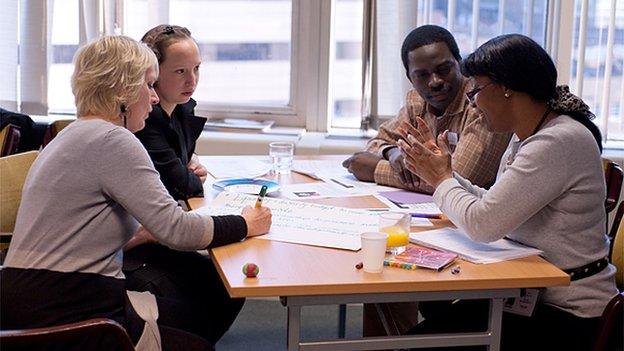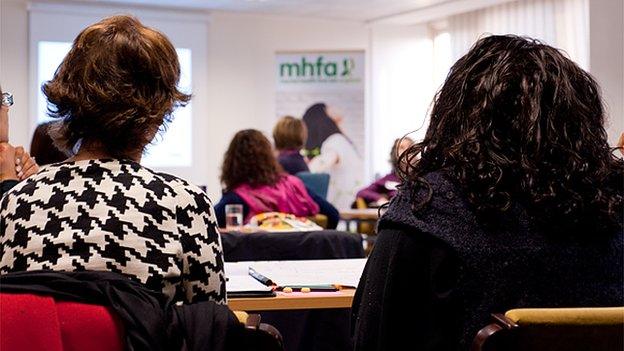Do you need a mental health first aider in the office?
- Published

Charlotte Walker trains people to be the go-to person in the office if someone gets badly stressed or has a meltdown.
"Hi, how are you?" Most of us start the working day by asking how colleagues are doing, but we may not expect an honest answer. What would you do if a colleague replied: "I'm struggling with my mental health." Would you feel able to respond? Or worried you may say the wrong thing?
For years I was a first aider in a busy office, dealing with everything from nosebleeds to chest pain and stroke. My training gave me the confidence to get involved and the knowledge to decide whether I needed paramedics. People often said I handled these incidents well, but mostly I just provided calm, compassionate support until the professionals arrived.
These days I give first aid training in the workplace - but for the mind, not the body.
First aid for physical health has been around for a century, but only in recent decades has something similar emerged for mental wellbeing. Originating in Australia, Mental Health First Aid (MHFA) is a programme which came to England in 2007.
Most mental health situations in the workplace won't be an emergency. Making a difference to a colleague who's struggling is easier than you might think and small acts of compassion can make a huge difference.
So what do these first aiders do? Often they do very simple things.
Somebody finding the start of the working day a little difficult, might welcome a friendly face at the bus stop or a bit of company on the walk to the office. A person with anxiety may appreciate you volunteering a desk swap so that they can sit somewhere quieter. A chat in a café at lunchtime or over a cup of tea can offer someone who's depressed a chance to say how they are really feeling, something they may not often get the chance to do.
One of the most helpful things anyone ever did for me was assist me to rearrange my "to do list" so that I felt less overwhelmed. Even those who are mentally well can help themselves keep things that way by building their resilience to stress and anxiety.
Simple strategies like buddying up for walks in the park or encouraging each other to leave work at a reasonable time can help nip workplace stress in the bud.

MHFA offers training in mental health symptoms, diagnoses and services
Mental health first aiders are trained to deal with common problems like anxiety or depression, through to more urgent situations like psychosis (when somebody is no longer in touch with reality) or suicidal thoughts.
I taught a group recently in which an HR officer had signed up because of an incident at work. She'd been asked to speak to an employee who immediately burst into tears in front of her. She had wanted to help him, but was afraid of getting it wrong and making things worse.
In training sessions, participants often say they're concerned they may not be the right person for the task. My fellow trainer John and I are both mental health service users and know how important it is that mental health is dealt with sensitively, but we believe participants already have what it takes to perform this role.
One in four people experience a mental health problem, yet we are often afraid of discussing the topic. As Poppy Jarman, CEO of MHFA England, says, "The fear surrounding mental ill health and the misunderstanding around recovery is one of the biggest barriers for creating mentally fit workplaces.

How would you react if a colleague cried in front of you?
"We just need to talk about mental health in the same way as we do physical health," she says, "but that can only be done if the culture of the workplace is set up in a way where mental health is promoted and there is empathy."
I really want to help develop that workplace culture of openness and empathy, because too many people with mental health conditions end up taking long-term sick leave or losing their jobs.
I would like to see every office have somebody trained in mental health first aid alongside physical first aiders, and according to MHFA England this is already starting to happen. And that means that more of the time when someone opens up in the workplace, a colleague will step forward and choose to keep that all-important conversation going.
MHFA England, external has around 600 instructors who have in turn trained over 77,000 people in first aid for mental health.
Charlotte Walker has bipolar disorder and blogs about her experiences here, external.
Follow @BBCOuch, external on Twitter and on Facebook, external, and listen to our monthly talk show